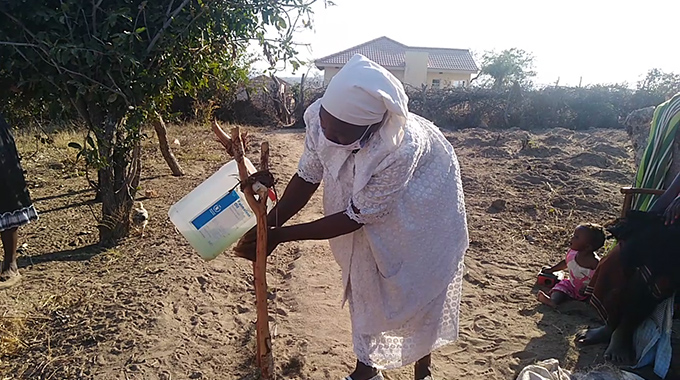Covid-19: Foot operated hand washing innovation keeps rural community safe

Muchaneta Chimuka Senior Reporter
Rural communities have taken heed of Government’s call to observe the World Health Organisation (WHO) Covid-19 guidelines and have come up with different innovations to ensure they are safe from the novel virus.
Most rural communities now practice regular handwashing with most installing foot operated water points at the entrance of their homesteads.
A visit to some rural communities in Gutaurare area in Mutare recently revealed that households and business premises at the growth points had invested in handwashing facilities.

Netsai Ndikudzei Muuduri
Gwaku Villager, Mrs Netsai Ndikudzei Muuduri said the practice was meant to protect families from contracting or spreading the Covid-19.
“We use soap and clean water to wash our hands. The water and soap solution is placed in a five litre container. We have designed this in a way that instead of using hands we use our feet to operate the system.
“The water container is usually placed at an ideal place like at the gate or the front yard to make sure that every visitor can easily utilize it. Here in the rural areas we cannot afford to buy sanitizers so it is cheaper for us to mix soap and water and do our hand washing routine. We know it’s very difficult not to greet people using hands here. Hence, if water is readily available like this, we wash our hands soon after to prevent the spread of corona virus,” added Muuduri.
She said they do not have access to the newspaper for Covid-19 information because of the costs.
“We access most news about Covid-19, through the radio and on our phones,” she said.
Another woman from the same area, Mrs Agnes Muradzikwa said the idea of having this hand washing model was brought by the community health workers.
“The community health workers here have made it mandatory for each and every household to install these hand washing devices noticing that many people were no longer washing their hands. This was a leading cause of typhoid, cholera and the recent Covid-19 infections. We are happy with it. It’s very easy to install and is user-friendly,” she said.
She added that they wash their hands after visiting the toilets, community meetings or even when they are coming from the nearby shopping centres to do their groceries.
“The hands are the major transmitters of Covid-19. When shopping people tend to touch different items. We are no longer going to funerals in huge numbers to prevent the spread of Covid-19.
“Village heads are always advising people on the dangers of huge gatherings,” she added.
Frequent and proper hand hygiene is one of the most important measures that can be used to prevent the Covid-19 virus.
As the Covid-19 pandemic spreads across the globe, millions of people are heeding the advice of health experts to wash their hands. But for three billion people around the world who do not have access to clean water and soap, this small action to prevent infection remains out of reach.
The World Bank is working closely with countries and partners to ensure communities have access to fixed and portable hand washing facilities, soap or alcohol-based hand rubs, and reliable water supplies.
As of August 13, Zimbabwe had lost 122 people due to Covid-19. There were 4 893 positive cases, 173 936 screened and 1 620 recoveries.









Comments